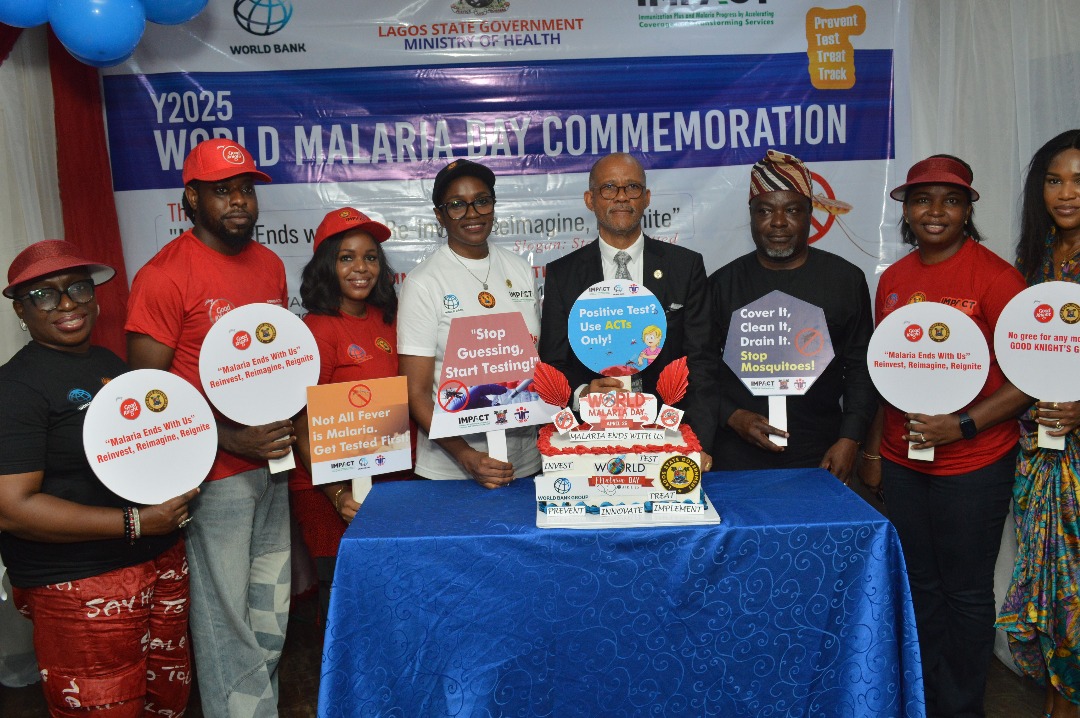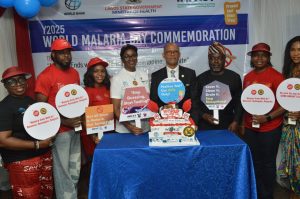
LAGOS, GOODKNIGHT, SFH PARTNER TO TACKLE MALARIA ON WORLD MALARIA DAY

The Lagos State Ministry of Health, alongside Society for Family Health and Goodknight Nigeria, commemorated the 2025 World Malaria Day with a lively awareness walk and a strategic media and stakeholders’ engagement. The events, held at Alausa-Ikeja, brought together major public health stakeholders, development partners, and government officials under the theme, “Malaria Ends With Us: Reinvest, Reimagine, Reignite.”
The awareness walk featured a vibrant parade of health workers, volunteers, and partners who moved through the Lagos State Government Secretariat and Alausa community, sharing educational materials and informing the public about malaria prevention. The activities culminated at the Folarin Coker Staff Clinic’s Conference Hall, where the Lagos State Commissioner for Health, Prof. Akin Abayomi, delivered a keynote speech, noting that Lagos is progressing steadily towards malaria pre-elimination with a current prevalence rate of 1.3%.
Leading the campaign, Prof. Akin Abayomi stated that Lagos had significantly reduced its malaria prevalence — from 15% in 2010 to 3% in 2023, and now to 1.3% as of March-April 2025. He emphasized that this progress signals Lagos’s move toward achieving malaria pre-elimination status, a major public health achievement.
The Commissioner explained that malaria, a disease transmitted by female Anopheles mosquitoes, requires accurate diagnosis and treatment with Artemisinin-based Combination Therapy (ACT). He stressed that early and correct treatment not only benefits the infected individual but also helps prevent the spread of the disease, urging citizens to trust test results and avoid unnecessary treatments.
Despite the decline in malaria cases, Prof. Abayomi expressed concern over the misuse of anti-malarial drugs, pointing out that while only 3% of fever cases test positive for malaria, over half are still being treated for it. He called for increased public education and responsible prescribing practices among healthcare providers.
He emphasized the continued vulnerability of pregnant women and children under five, highlighting the need for proper testing and treatment in these groups. Prof. Abayomi also acknowledged the importance of collaborations with the World Health Organization, Federal Ministry of Health, and Pharmacy Council of Nigeria under the IMPACT Project in the fight against malaria.
Prof. Abayomi pointed to Lagos State’s 15-year commitment to the National Malaria Strategic Plan and credited the consistent efforts of previous Health Commissioners and public health workers. He noted that success has come through sustained testing, correct treatment, and strong data tracking.
He further praised the leadership of Governor Babajide Sanwo-Olu, highlighting his endorsement of the malaria pre-elimination agenda. Prof. Abayomi emphasized that Lagos’s progress is driven by strong political will, strategic partnerships, and evidence-based policies aiming to achieve a malaria-free state.
Earlier at the event, the Special Adviser to the Governor on Health, Dr. (Mrs) Kemi Ogunyemi, stressed the critical role of community involvement and behavioural change in the fight against malaria. She stated that true success requires efforts beyond clinics, reaching into homes, schools, markets, and media spaces.
Dr. Ogunyemi commended development partners like Society for Family Health and Goodknight for their ongoing contributions, particularly in public education and vector control efforts, emphasizing that their partnerships help amplify the state’s malaria prevention campaigns.
She encouraged the media to continue playing a vital role in public health education, urging them to bridge the gap between scientific knowledge and public understanding, and to clarify misconceptions about fever and malaria.
Speaking during the event, Dr. Olusegun Ogboye, Permanent Secretary of the Lagos State Ministry of Health, urged attendees to see themselves as champions of malaria elimination. He emphasized the importance of testing before treatment, warning that unnecessary use of anti-malarials leads to financial waste.
Dr. Ogboye highlighted the benefits of the Ilera Eko Health Insurance scheme in providing affordable malaria testing and treatment. He encouraged participants to spread awareness within their communities, workplaces, and schools.
Dr. Stanley Ugah, Project Director of the Society for Family Health (SFH) IMPACT Project, reaffirmed SFH’s support for Lagos State’s “Test Before Treatment” initiative. He emphasized the importance of diagnostic confirmation before administering antimalarial drugs to avoid misuse.
Dr. Ugah added that SFH, with World Bank support, is training healthcare providers and working within communities to improve malaria case management and create greater awareness, aiming to be part of Lagos’s eventual malaria-free status.
Oluwatimilehin Dada, Brand Manager for Goodknight Nigeria, expressed pride in supporting Lagos State’s malaria elimination efforts. He affirmed that Goodknight’s mission aligns with the government’s vision of protecting homes from mosquito-borne illnesses.
Dada thanked the Lagos State Government for the opportunity to contribute and highlighted Godrej’s dedication to health innovation. He showcased Goodknight’s range of insecticide products designed to fight malaria-carrying mosquitoes.
He encouraged families to invest in mosquito control products and adopt proactive measures in line with the year’s theme: “Reinvest, Reimagine, Reignite,” stressing the importance of testing and avoiding self-medication.
Dr. Simisola Alabi, Public Health Physician for the Malaria Pre-Elimination and Digitization Project at Maisha Meds, reaffirmed the organization’s partnership with the Lagos State Government. She explained how Maisha Meds is using digital tools to advance malaria control through better diagnosis and case management at community levels.
Dr. Alabi noted that Maisha Meds operates across over 4,700 sites in Africa, leveraging technology to bridge healthcare gaps. She commended Lagos State for its innovative approach and expressed optimism about reducing the malaria burden below one percent.
Aisha Abdulkareem, Assistant Public Health Officer for the World Health Organization (WHO), shared global malaria statistics, emphasizing that despite major progress, challenges like climate change and economic instability threaten gains. She called for renewed investments and innovative strategies to sustain progress.
The event concluded with a strong call for greater collaboration across sectors, an improved culture of testing before treatment, and sustained public health investments. With data showing promising trends, Lagos is steadily moving toward becoming Nigeria’s first malaria-free state.
